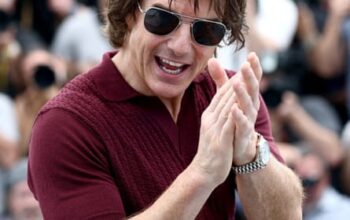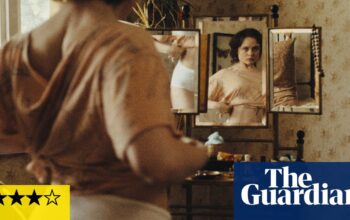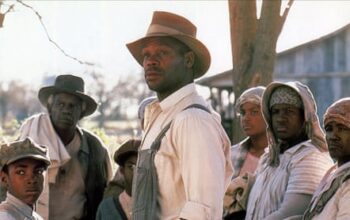20. Around the World in 80 Days (1956)
An early Shirley in this epic Technicolor comedy-adventure based on Jules Verne, overstuffed with superstar cameos and produced by the impresario Mike Todd. David Niven sauntered through the role of the globe-circling gent Phileas Fogg and 22-year-old MacLaine was cast in the way Hollywood sometimes saw her in those days … as someone whose feline, gamine looks had something exotic and Asiatic about them. She was the Indian Princess Aouda, widowed after a loveless arranged marriage but rescued from the funeral pyre by the bold Fogg, whom she then joins on his travels for a while. A sweet and likable comic turn.
19. Artists and Models (1955)
There can’t be a much more thankless task for any young female star in 50s Hollywood than playing the third wheel in a movie starring Jerry Lewis and Dean Martin. But MacLaine gamely carried it off and this was a singing role – strangely, there aren’t that many musicals in her credit list. She plays Bessie, a talented comic-cook artist living next door to a couple of goofy guys: Martin is the smooth ladies-man Rick and Lewis is his zany roommate, Eugene, frantically obsessed with the kind of raunchy comics she’s creating. It was rather a racy film in some ways, but it also showcases another side to MacLaine that producers kept emphasising, however worldly the role: the kooky kid sister image, inspiring protective gallantry.
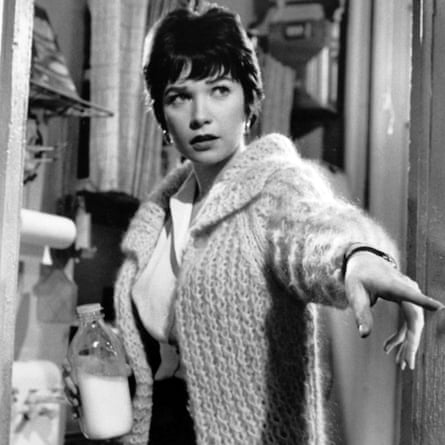
18. Two for the Seesaw (1962)
MacLaine and Robert Mitchum is an intriguing pairing in this downbeat drama, adapted from a Broadway two-hander, and this was a much more un-innocent sex-and-the-single-girl role for MacLaine, wised up about men, especially married men, but still a romantic at heart. It was probably building on the success of her role in Billy Wilder’s big-city romance The Apartment, although this is a darker, more adult character. Mitchum plays a small-town lawyer in New York getting away from a failed marriage and beginning a troubled relationship with MacLaine’s struggling dancer Gittel, though jealous of her bohemian friendships with other men.
17. Guarding Tess (1994)
The present participle in the title (traditionally a signal for quirky comedy) also hints at the Driving Miss Daisy resemblance and this movie shows us the persona that MacLaine was, for good or ill, landed with for so much of her career third act – the exasperating but lovably cantankerous old dame. She is Tess Carlisle, the widow of a deceased US president and as a former first lady, entitled to a secret service protection detail. This means she has to be chauffeured around by Agent Doug Chesnic, robustly played by Nicolas Cage. There’s a fair bit of fun in their meet-cute relationship, though neither is at full throttle.
16. What a Way to Go! (1964)
This portmanteau-type comedy (from a script by the veterans Betty Comden and Adolph Green) has a dated hokiness, but plenty of fizz and it is at least a movie in which MacLaine is the central star, who is not required to be a submissive romantic foil to a man, though her male co-stars here are out of the top drawer: Paul Newman, Robert Mitchum, Dean Martin and Gene Kelly. She plays wealthy Louisa, who narrates her life story to a clueless psychotherapist, recounting the way she outlived a series of wealthy husbands, becoming progressively richer in the process.
15. In Her Shoes (2005)
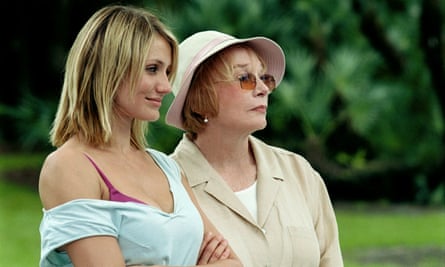
Curtis Hanson’s multigenerational comedy heartwarmer stars Cameron Diaz as the dazzlingly gorgeous but cash-strapped fashionista whose romantic shenanigans get her in trouble and she winds up crashing rent-free with her grandma in her retirement-community apartment. That of course is MacLaine. In Her Shoes gave us a late example of a variation (popularised by Terms of Endearment) on MacLaine’s old-dame typecasting: the old-dame whose sharp-tongued no-bullshit stance achieves maximum grandmotherly sympathy as part of an extended-family ensemble.
14. Gambit (1966)
Here was a tasty 60s romantic crime caper whose memory was unfortunately scuffed by the misjudged Coens remake in 2012. It may be dated now, and MacLaine is forced into the exotic/Asian stereotype, but there’s a gaiety and sprightliness to the way this film tap dances its way through its absurd premise. Pitched slightly darker, it might have been one for Hitchcock. Michael Caine is the cheeky cockney cat-burglar Harry, who is astonished by the showgirl Nicole Chang in a seamy Hong Kong nightspot: the adorably demure MacLaine in gorgeous cheongsam mode. He figures he can use her in his latest larcenous plan because she is an eerie doppelganger for the late wife of a very rich potentate (a fez-wearing Herbert Lom) and also the dead-spit of this man’s priceless statuette, which Harry wants to pinch. It’s pure romcom gold when MacLaine gets from Caine a wonderful romantic declaration: “You’re a clever girl and I love you.”
13. Madame Sousatzka (1988)
A big, elaborately detailed “foreign accent” role for MacLaine, in a John Schlesinger film based on the Bernice Rubens novel, a role in fact that fuses the “old dame” part of her later brand identity with that exotic foreignness that directors would keep seeing in her. She is Madame Sousatzka, the demanding and passionate expat Russian piano teacher in London teaching a teen Indian prodigy, played by Navin Chowdhry, and becoming ever more possessively committed to his development and coming into conflict with his mother. It’s a big-hearted, imperious performance that got MacLaine a Golden Globe and best actress at Venice.
12. Being There (1979)
Hal Ashby’s elaborate parable of ambition was the swansong for Peter Sellers, playing the savant innocent Chauncey, knowing of the world only what he’s seen on TV, but whose childlike aphorisms are mistaken for brilliant insights by the insecure political classes. But it was a striking supporting role for MacLaine, playing Eve, a plutocrat’s younger wife who first befriends the learning-disabled gardener Chauncey and begins a sexual relationship with him, masturbating in front of Chauncey when he blandly announces that he “likes to watch” and she doesn’t understand this means TV, not voyeurism. Sellers was of course a master upstager and MacLaine wasn’t allowed much of the tragicomic oxygen he was sucking out of the room, but she held her own.
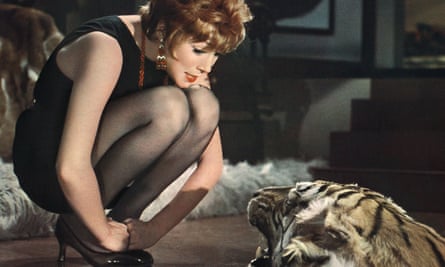
11. Sweet Charity (1969)
MacLaine has a satisfying starring role in this forthright and entertaining musical from Bob Fosse that nonetheless falls a little short of classic status. It is inspired by Federico Fellini’s movie Nights of Cabiria – although MacLaine is probably too sunny and upbeat to compare with the Chaplinesque pathos of that film’s star, Giulietta Masina. As in Irma La Douce, MacLaine plays a quaintly romanticised sex worker, although here that is softened to “taxi dancer” (a nightclub hostess paid for each dance). She meets various men and each time thinks that this might be The One, and each time these men let her down. MacLaine socks over a great song in If My Friends Could See Me Now.
10. The Trouble with Harry (1955)
MacLaine made her elegant screen debut at 21 as the svelte, pert widow of a dead man in this bizarre absurdist nightmare by Alfred Hitchcock, a movie to compare with Ionesco. In a sweet little Vermont town, the corpse of a man called Harry is discovered. The pretty young woman to whom he was married – MacLaine – doesn’t seem at all unhappy to register the fact, and she has a very flirtatious relationship with a would-be artist, played by John Forsythe, who makes it very plain he would like her to undress so he can paint her. MacLaine is not really a Hitchcock heroine: too smart, too self-aware, too non-blond.
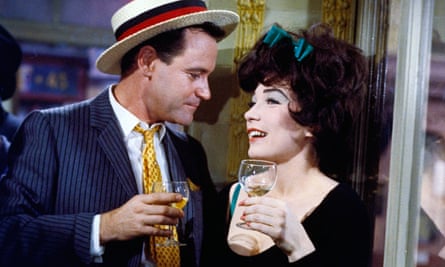
9. Irma La Douce (1963)
MacLaine and Jack Lemmon were more famously (and successfully) paired elsewhere, but Shirley gives this movie her authentic showbiz pizzazz and hoofer’s energy. She is Irma La Douce, that nickname (“the sweet”) signalling the quaintly euphemistic and romantic way her sex-worker existence is portrayed. Lemmon, all ungainly elbows and jutting chin, plays the clueless Nestor, an ex-cop unjustly drummed out of the force, who winds up falling in love with Irma, unwittingly becoming her pimp and then bizarrely disguising himself as an English milord who will be her only client.
8. Two Mules for Sister Sara (1970)
Clint Eastwood and MacLaine in a violent Don Siegel movie is a great face-off in this brash western, in which MacLaine’s demanding character certainly elicits the classic Clint narrow-eyed expression of astonished incredulity. He is Hogan, a US soldier turned mercenary, a guy whose natural cynicism evaporates when he sees Sister Sara, played by MacLaine, having her habit torn off (in longshot) by bandits about to rape her. Hogan dispatches these loathsome types with his gun and gallantly accompanies Sister Sara, though he is disconcerted by her somewhat un-nun-like language and discovers she is not what he assumes her to be. Good stuff, of course, although maybe it would work better if she really was a nun.
7. The Children’s Hour (1961)
A heartfelt issue movie, taken from the Lillian Hellman stage play, which leads to a shocking and upsetting denouement for MacLaine’s character – though also a denouement which suggests that even the appearance of sexual nonconformism really can’t end well. MacLaine and Audrey Hepburn play Martha and Karen, two friends who open a private boarding school for girls. A spiteful, bullying girl spreads the rumour that Martha and Karen have a lesbian relationship and the whisper spreads toxically. MacLaine vehemently gives the part her all and she rather outclasses the rather soignée Hepburn.
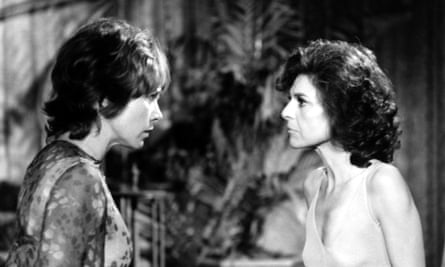
6. The Turning Point (1977)
A serious, self-consciously adult and literate grownup drama of the sort MacLaine did not often star in, gravitating to more florid theatricality. Here she faces off with Anne Bancroft, and the opposition is something to be savoured. MacLaine got an Oscar nomination for playing DeeDee, a woman who was once a promising ballerina but chose to give it all up when she got pregnant and left to run a dance studio with her husband. Meanwhile her main friend and rival, Emma (played by Bancroft), became a huge star and is now the godmother to DeeDee’s daughter, herself a would-be dancer. But a reunion between the two women triggers an explosion of resentment as DeeDee reveals how she feels she was coerced into sacrificing her future for Emma’s. A fierce, naturalist performance from MacLaine.
5. Steel Magnolias (1989)
This was MacLaine’s other explosively lachrymose and shamelessly manipulative movie – set in and around a southern beauty salon – in which her oldster presence in the ensemble was important in underscoring the drama’s sincerity and substance, although this A-list female lineup were all perhaps outshone by the young Julia Roberts, making her sensational debut. MacLaine is just about the right side of hammy, as Louisa, or “Ouiser”, the grouchy old meanie being incessantly goaded by the rich widow Olympia Dukakis. She’s outrageously over-the-top, like the other senior cast members, but always brings warmth and fun.
4. Woman Times Seven (1967)
Fascinatingly, and perhaps uniquely, Vittorio De Sica gave the young MacLaine a film that really did show her as a sexually charismatic lead and also a character actor who could differentiate comic performances with artistry and technique. It’s a portmanteau film with seven tales, mostly about infidelity. A widow walking in a funeral procession is hit on by the family doctor. A woman enraged by her husband’s adultery vows to seduce the first man she finds. A translator gets into a bizarre three-way. The dissatisfied wife of a conceited writer stages surreal domestic scenes to signal her discontent. A fashion-victim plans a bomb-blast to destroy a rival. A lover is terrified by their own suicide pact. A married woman is followed home. It’s maybe a little dated in its 60s-ness, but stylish and potent nonetheless. None of her other films allowed her to read TS Eliot aloud while naked.
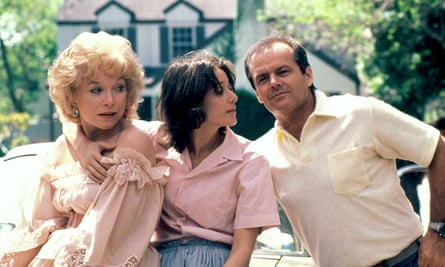
3. Terms of Endearment (1983)
MacLaine’s Oscar-winning moment finally arrived in a family-based comedy heartwarmer and heartbreaker, based on the Larry McMurtry novel – written and directed with lethal power by James L Brooks, who knew (like MacLaine) how to push an audience’s buttons and flood its tear ducts. Shirley is Aurora, a demanding and controlling mother to Emma, played by Debra Winger, who marries Jeff Daniels’ slippery and venal college professor just to get away from her mom – though it is Aurora who sees this man for who he is. Meanwhile, she finds herself in a relationship with her wild-man neighbour, played with reptilian deadpan sexiness by Jack Nicholson and the two sides of her personality – lover, mother – are torn into two when a crisis arrives, the springboard for some passionate declamatory acting from MacLaine. A sugar-rush of emotion is what this film provided for its fans. Tragedy wasn’t precisely MacLaine’s forte, but she was triumphant.
2. Postcards from the Edge (1990)
MacLaine gave one of her very best performances, a tragicomedy of Hollywood family dysfunction, based on the Carrie Fisher novel, in which she was in effect playing a version of Fisher’s iconic mother, Debbie Reynolds. Meryl Streep plays the jaded and depressed movie star, in deep trouble with drugs, who is forced by the movie’s insurance company to live with a reputable individual – her mother, Doris, played with imperious and hilarious gusto by MacLaine, a tinseltown veteran who loves movie gossip and movie lore and loves lording it over and criticising her movie star daughter – while finding validation by vicariously living through her. MacLaine has a showstopper with the song I’m Still Here. It’s interesting to see her matched with Streep, who got the serious roles that MacLaine never really did, and it provides a meta-level of poignancy.
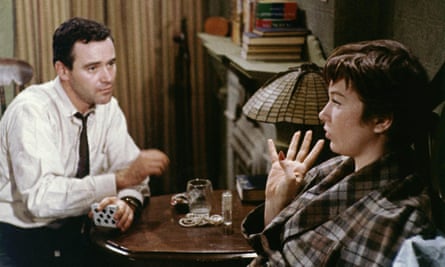
1. The Apartment (1960)
Like a figure from Edward Hopper, MacLaine is Fran, the unforgettably lonely, beautiful elevator operator in 60s corporate New York marooned and imprisoned in the multiple-coffin-sized box going up and down and obediently pressing the buttons for other people. Junior salaryman Bud, played by Jack Lemmon, is shyly in love with her, while buttering up senior married executives by letting them use his apartment for extramarital liaisons – hating himself for it, and then devastated by what he realises about Fran. It’s a movie that influenced the TV drama Mad Men (although ad exec Roger boorishly remarks that The Apartment isn’t believable because the elevator operator is white). Fred MacMurray is the creep who is breaking Fran’s heart and who then gives her a $100 bill as a goodbye present after she confronts him – with catastrophic results. But their tender love-affair, a meeting of two lonely people, concludes with a delicately conjugal game of cards (like an old married couple) and MacLaine has one of Hollywood’s most famously unsentimental last lines: “Shut up and deal!”
Source: theguardian.com
